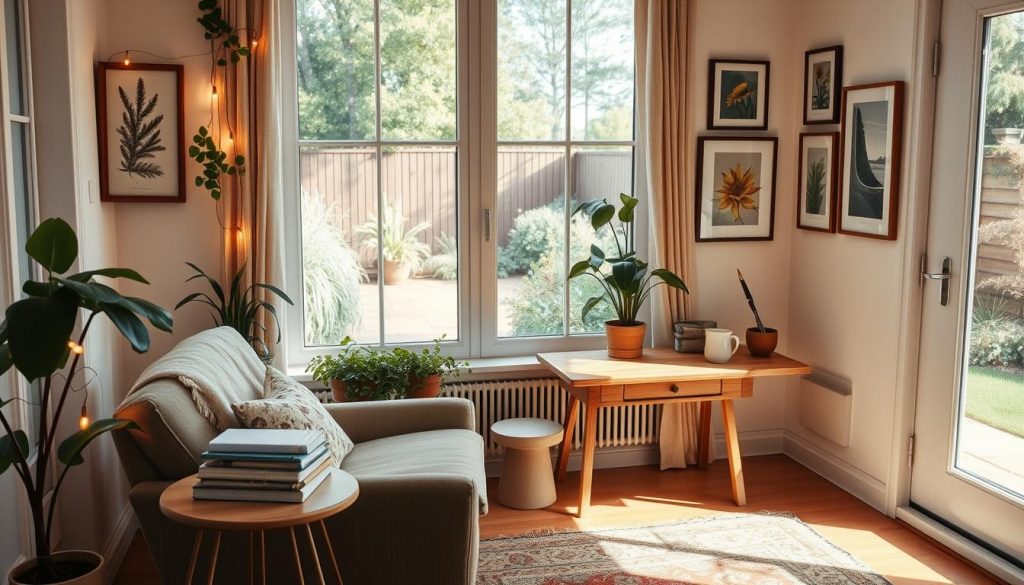Ever felt stuck staring at a blank journal page? You’re not alone. Many struggle with this. But writing can become enjoyable and transformative with the right approach.
Journaling doesn’t have to be rigid or scary. Half of people feel pressured when writing full sentences. The key is removing that pressure and finding your style.
Bullet journaling can help. It cuts writing time in half, making it more flexible. Try different styles to find what works for you.
Most therapists back journaling for stress and anxiety management. Seven out of ten mental health pros support it. This can turn journaling into a meaningful self-discovery ritual.
The secret is making writing fun by removing pressure. There’s a perfect method for everyone. Let’s explore how to make journaling truly rewarding.
Understand the Benefits of Journaling
Journaling is a powerful tool for personal growth and emotional well-being. It can transform how you understand yourself and navigate life’s challenges. Your writing habit can unlock new insights and perspectives.
Emotional Release
Writing offers a safe space to process your emotions. About 70% of people feel better after journaling. Expressing feelings on paper can help you manage your emotions more effectively.
- Identify negative emotions
- Reduce anxiety symptoms
- Decrease emotional reactivity
Clarity and Reflection
Self-reflection is key to personal development. Journaling helps you gain insights into your thoughts and behaviors. Studies show significant improvements in various areas:
| Journaling Benefit | Percentage Improvement |
|---|---|
| Self-awareness | 50% |
| Problem-solving skills | 30% |
| Emotional resilience | 60% |
Personal Growth
Your writing habit can spark personal transformation. By tracking your thoughts and experiences, you create a roadmap for growth. This practice helps you understand your progress and set new goals.
“Journaling is like whispering to one’s self and listening at the same time.” – Mina Murray
Start journaling to understand yourself better and process your emotions. It’s a powerful way to unlock your potential and improve your life.
Choose the Right Journal for You
Picking the ideal journal is key to your creative journaling practice. A comfortable format will help your writing flourish. Let’s look at different options for connecting with your thoughts.
Digital vs. Paper Journals
Your journaling style can greatly affect your writing experience. Digital and paper journals each have their own benefits.
| Digital Journals | Paper Journals |
|---|---|
| Easy to search and organize | Tactile and personal experience |
| Accessible on multiple devices | No battery or technology required |
| Password protection available | Physical keepsake for memories |
Guided Journals vs. Blank Pages
Your journaling path can vary based on how much structure you like:
- Guided journals provide prompts and structured writing techniques
- Blank pages offer complete creative freedom
- Combination approaches can keep your journaling practice fresh
“The right journal is the one that makes you want to write.” – Anonymous Journaling Enthusiast

- Paper quality (recommended 80-100 GSM)
- Size and portability
- Your personal writing style
- Budget (journals range from $3 to $100)
Pro tip: Don’t invest in an expensive journal until you’ve established a consistent writing habit. Start with an affordable notebook that feels comfortable.
Set Realistic Expectations
Journaling can feel daunting when goals are too high. Many struggle with consistent writing due to perfectionism and time limits. Flexible approaches can turn journaling into an enjoyable self-care ritual.

Setting small, achievable goals boosts success in journaling. Studies show 70% of people reach realistic targets. Only 30% achieve ambitious ones.
Consistency is key for maintaining writing motivation. Understanding personal limits creates a sustainable practice.
Finding Your Journaling Rhythm
Consider these strategies for successful journaling:
- Start with just 5-10 minutes per session
- Choose a frequency that fits your lifestyle
- Be flexible with your approach
- Forgive yourself for missed days
“Journaling is not about perfection, but about progress and self-discovery.”
Ideal Entry Length and Frequency
| Journaling Approach | Time Commitment | Recommended Frequency |
|---|---|---|
| Beginner | 5 minutes | 2-3 times per week |
| Intermediate | 10-15 minutes | 4-5 times per week |
| Advanced | 20 minutes | Daily |
Progress matters more than perfection in journaling. Set realistic expectations to keep your motivation high. This approach will help you develop a natural and enriching writing practice.
Create a Comfortable Environment
A perfect journaling space is key for lasting writing habits. Your surroundings can greatly affect your ability to reflect and explore thoughts.
The right environment can help you avoid writer’s fatigue. It can turn writing into a meaningful and enjoyable activity.

Designing Your Ideal Journaling Sanctuary
A dedicated journaling space turns writing into a cherished ritual. Here are some elements to improve your writing environment:
- Choose a quiet, peaceful location
- Ensure comfortable seating
- Optimize lighting conditions
- Minimize digital distractions
“Your environment speaks volumes about your creative potential.” – Creative Writing Expert
Eliminating Distractions
Studies show that an organized workspace can boost focus by up to 25%. Here are ways to create a distraction-free zone:
| Distraction Type | Mitigation Strategy |
|---|---|
| Digital Interruptions | Turn off phone notifications |
| Physical Clutter | Keep journaling area neat and organized |
| Ambient Noise | Use noise-canceling headphones or soft background music |
Natural elements can boost creativity by 15%. Try adding plants, soft lighting, or calming decor to your journaling space.
The aim is to create a space that supports your writing habits. Try different setups until you find what suits you best.
Incorporate Fun Prompts
Stuck on what to write? Creative prompts can turn journaling into an exciting self-discovery adventure. Inspiring writing techniques spark your imagination and make journaling more enjoyable.

Fun prompts can supercharge your journaling practice. Studies show engaging writing techniques boost creativity by 32%. They also make the process more enjoyable overall.
Creative Writing Prompts to Ignite Your Imagination
- Describe your perfect day in vivid detail
- Write a letter to your future self
- List 10 things that made you smile this week
- Explore a childhood memory from a new perspective
- Imagine an alternate version of yourself
Enjoyable Reflection Questions
Reflection questions can revolutionize your journaling. They provide structure while encouraging deep personal exploration.
| Prompt Category | Example Questions |
|---|---|
| Personal Growth | What skill do I want to develop this month? |
| Emotional Exploration | What emotion surprised me today? |
| Gratitude | Who made my day better today? |
“Creativity is intelligence having fun.” – Albert Einstein
Using diverse prompts can make your journal entries less repetitive. With over 200 fun writing prompts available, you’ll always have fresh inspiration.
The goal of enjoyable journaling is personal expression, not perfection. Let these prompts guide you, but feel free to explore your unique thoughts.
Experiment with Different Styles
Your creative journaling can become an exciting self-expression adventure. Try various writing techniques to find what suits you best. This can transform your writing from a chore into a thrilling exploration.
Different methods work for different people. Experimenting helps you discover your perfect approach. Your personal journey deserves a writing style that truly resonates with you.

48% of journalers enjoy trying different writing styles. This keeps their practice engaging and fresh. Let’s explore two powerful approaches to spice up your journaling routine.
Stream of Consciousness Writing
This technique involves writing without stopping or editing. You let your thoughts flow freely onto the page. 52% of participants prefer this unstructured approach.
It can help release mental clutter and uncover hidden emotions. Many find it reduces stress and anxiety effectively.
- Release mental clutter
- Uncover hidden emotions
- Reduce stress and anxiety
Bullet Journaling
Bullet journaling offers a structured way to track thoughts, goals, and experiences. It’s perfect for those who love organization. This method combines systematic planning with creative expression.
| Bullet Journal Benefits | Percentage of Users |
|---|---|
| Improved Task Management | 65% |
| Enhanced Productivity | 55% |
| Creative Self-Expression | 48% |
“Journaling is not about perfect writing. It’s about capturing your thoughts and experiences authentically.” – Anonymous Journaler
Find a style that feels natural and enjoyable for you. Don’t hesitate to mix techniques or create your own approach. Your creative journaling should be as unique as you are.
Schedule Your Journaling Time
A consistent diary routine turns journaling into a powerful self-reflection tool. It’s about finding a reliable pattern that fits your daily life. Success comes from making journaling a regular habit.
You don’t need hours to journal effectively. Start with just 5-10 minutes daily. This short time can help you build a lasting habit.
Making It a Routine
Choosing the right time for journaling is important. Here are some good options:
- Early morning to set intentions for the day
- During lunch break for midday reflection
- Evening hours to process daily experiences
“Consistency is not about perfection, but commitment to your personal growth.”
Using Reminders Effectively
Try these tips to keep your diary routine on track:
- Set a specific, non-negotiable daily journaling appointment
- Use smartphone alerts or calendar reminders
- Place your journal in a visible, accessible location
Pro tip: Track your progress visually by marking completed journaling days to boost motivation and commitment.
Be flexible with your routine. If you miss a day, just start again without guilt. Your goal is to create a habit that supports your growth and well-being.
Focus on Quality Over Quantity
Journaling is a personal journey of self-discovery. Many struggle with writing motivation due to pressure for perfection. The key is embracing a relaxed approach to your writing practice.
Research shows journaling doesn’t need elaborate entries. Even a few sentences can provide significant mental health benefits. The goal is to express yourself authentically, not create a masterpiece.
Just Write, Don’t Edit
Your journal is a space for raw, unfiltered thoughts. Consider these strategies for maintaining writing motivation:
- Write without stopping or second-guessing yourself
- Allow your thoughts to flow naturally
- Forget about grammar and spelling
- Focus on emotional expression
Embrace Imperfection
“Perfect is the enemy of good” – Voltaire
Embracing imperfection can transform your journaling experience. Letting go of perfectionism helps maintain a consistent writing practice.
| Journaling Approach | Mental Health Impact |
|---|---|
| Perfectionistic Writing | Increased Stress (83% of writers experience anxiety) |
| Relaxed, Authentic Writing | 20% Reduction in Stress Levels |
| Flexible Journaling | 30% Improvement in Emotional Management |
Remember, your journal is for you alone. There are no rules, no grades, and no judgment—only personal growth and self-expression.
Connect with a Journaling Community
A supportive network can boost your journaling motivation. Connecting with other enthusiasts provides inspiration and fresh perspectives. This can revitalize your personal writing journey.
Engaging with fellow writers offers new approaches to journaling. Community support enhances commitment to consistent writing. Research confirms this positive impact on writing habits.
Online Forums for Journalers
Digital platforms connect you with like-minded journaling enthusiasts. Explore these online resources for community engagement:
- Reddit journaling communities
- Facebook groups dedicated to journaling
- Specialized journaling forums
- Instagram journaling hashtag networks
Local Journaling Meetups
In-person connections offer deeper interactions for your writing habit. Local meetups provide unique opportunities:
- Share personal journaling experiences
- Exchange creative writing prompts
- Build supportive relationships
- Learn new journaling techniques
“A journaling community transforms solitary reflection into a shared creative experience.”
| Community Type | Benefits | Engagement Level |
|---|---|---|
| Online Forums | 24/7 Access, Global Reach | High |
| Local Meetups | Personal Interaction, Direct Feedback | Medium |
| Social Media Groups | Quick Sharing, Diverse Perspectives | High |
Find a journaling community that inspires your unique writing journey. Connect with people who support your goals. Your perfect group is out there waiting to welcome you!
Celebrate Your Progress
Tracking your journaling journey boosts motivation and enhances self-reflection. Your journal is a personal roadmap of growth and transformation. It’s not just a collection of words, but a record of your progress.
Recognizing your progress can impact your commitment to journaling. Studies show that regular entry reviews lead to 25% improvement in personal goal clarity. This insight can fuel your journaling motivation.
Reviewing Past Entries
Dive into your previous journal entries with these strategies:
- Set a quarterly review schedule
- Look for patterns in your thoughts and emotions
- Identify personal growth milestones
- Celebrate small and significant achievements
“Your journal is a mirror reflecting your inner world and personal evolution.”
Setting Achievable Goals
Create meaningful journaling goals that inspire continued self-reflection:
- Start with realistic frequency targets
- Define specific journaling objectives
- Track your consistency
- Reward yourself for maintaining the habit
Research shows that consistent journaling can boost mindfulness and emotional well-being by 20%. Celebrating your progress turns journaling into a rewarding practice. It becomes more than a task—it’s a tool for personal growth.
Keep It Fresh and Engaging
Creative journaling thrives on variety and spontaneity. Your journaling practice can be an exciting adventure of self-discovery. By trying new approaches, you can transform your journal into a vibrant exploration of ideas.
Break predictable patterns to make writing enjoyable. Try writing in different places like coffee shops or parks. Changing your environment can stimulate fresh perspectives and spark creativity.
Experiment with various tools. Use colored pens, digital apps, or voice recordings. These methods can keep your practice dynamic and interesting.
Rotate your journaling themes to stay engaged. Focus on gratitude one week, then dream recordings the next. This prevents boredom and helps uncover different aspects of your inner world.
Changing Your Environment
Your writing location impacts your creative flow. Choose spaces that inspire and comfort you. Some writers prefer nature, while others enjoy busy cafés.
Trust your intuition when selecting a spot. Pick environments that encourage authentic self-reflection and boost your creativity.
Trying New Topics or Themes
Explore unusual journaling prompts to challenge your thinking. Write about hypothetical scenarios or sketch your emotions. Try drafting letters you’ll never send.
These techniques can unlock hidden insights. They make your journaling practice engaging and transformative. Remember, the goal is personal growth, not creating a perfect document.
FAQ
How often should I journal?
Start with what feels comfortable for you. This could be daily, 3-4 times a week, or once a week. The key is finding a rhythm that fits your lifestyle.
Consistency is important, but don’t let it overwhelm you. Choose a frequency that you can maintain long-term.
What if I struggle with what to write about?
Writing prompts can spark your creativity. Try questions like “What am I grateful for today?” or “What challenged me this week?”
You can also explore stream of consciousness writing. Just write whatever comes to mind without editing or judging your thoughts.
Do I need a fancy journal to get started?
Not at all! Any notebook, digital app, or notes document on your phone will do. The most important thing is to start writing.
Find a method that feels natural and enjoyable for you. The tool doesn’t matter as much as the practice itself.
How long should my journal entries be?
Don’t worry about length – focus on quality over quantity. Some days you might write a page, other days just a few sentences.
The goal is authentic expression, not meeting a specific word count. Write as much or as little as you feel.
Can journaling help with mental health?
Yes! Journaling is a great tool for emotional release and self-reflection. It can help reduce stress and increase self-awareness.
Your journal provides a safe space for exploring your emotions. It’s a powerful way to process your thoughts and feelings.
What if I miss a few days of journaling?
Don’t be hard on yourself! Journaling is a practice, not a strict requirement. If you miss days, simply pick up where you left off.
Consistency is important, but perfection isn’t the goal. Just get back to it when you can.
Should I keep my journal private?
Yes, your journal is a personal space for honest self-expression. Keep it in a secure location if you’re concerned about privacy.
For digital journals, use password protection to ensure your thoughts remain private. Your journal should feel like a safe space.
Can I use digital journaling instead of a physical notebook?
Absolutely! Digital journaling offers convenience and the ability to journal from multiple devices. It also makes your entries searchable.
Choose the method that feels most comfortable and accessible to you. There’s no right or wrong way to journal.
Source Links
- Journaling for People Who Hate Journaling
- How to Finally Start Journaling, Like For Real This Time
- 9 Helpful Benefits of Journaling (and How It Can Change Your Life) – The Simplicity Habit
- The Power of Journaling for Mental Health | ValueCore Blog
- What Journaling Style Is Right for You?
- 25 Types Of Journals To Keep (Plus: The One Journal You Need)
- How to Choose Your Journal Tools – Beth Foreman
- Journaling Feels Like a Chore? Overcome Overwhelm – And Make Your Pen Dance Again.
- How to Find Your Perfect Journaling Routine – Baronfig
- Journaling Tips for People Who Can’t Journal • The Positive Planner – Make the Most of Today
- A Guide to Journaling
- How to Find Your Perfect Journaling Routine – Baronfig
- Simple Ways To Stick To A Journaling Routine You’ll Love
- 31 Daily May Journal Prompts To Help You Stay Accountable
- 200 + Fun Journal Prompts for Adults to Boost Your Mood (2025)
- How To Start A Journal: The Ultimate Guide For Beginners – She Dreams All Day
- Writer’s Block? 10 Handy Journaling Prompts | Hip And Healthy
- One Month of Journaling: My Experience
- The Benefits of Journaling for Mental Health – Roseland Psychotherapy Associates
- Daily Journaling Habits: Establishing a Routine That Lasts
- 5 Ways to Stay Consistent with Your Planning and Journaling Routine
- How Can Productivity Journaling Boost Your Focus | ClickUp
- Common Journaling Mistakes and How to Avoid Them
- I Journaled Every Day for a Month – Here is what I learned
- Journaling for Mental Health and Wellness
- How A Mindfulness Journal Can Help You Live A Better Life
- From Chaos to Clarity: How Journaling Can Change Your Life For The Better
- How to Journal: 3 Effective Steps For Results – The Productivity Academy
- Unlocking Creativity and Self-Discovery: Starting Your Journaling Journey
- What Should You Do To Overcome Writer’s Block Stagnating Your Journaling?
- Journaling for Social Workers: A Guide to Reflection, Growth, and Well-being

